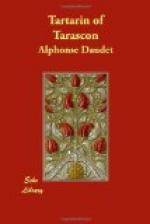Tartarin of Tarascon had no luggage. Here he comes down the Rue de la Marine through the little market, full of bananas and melons, accompanied by his friend Barbassou. The hapless Tarasconian left on the Moorish strand his gun-cases and his illusions, and now he had to sail for Tarascon with his hands in his otherwise empty pockets. He had barely leaped into the captain’s cutter before a breathless beast slid down from the heights of the square and galloped towards him. It was the faithful camel, who had been hunting after his master in Algiers during the last four-and-twenty hours.
On seeing him, Tartarin changed countenance, and feigned not to know him, but the camel was not going to be put off. He scampered along the quay; he whinnied for his friend, and regarded him with affection.
“Take me away,” his sad eyes seemed to say, “take me away in your ship, far, far from this sham Arabia, this ridiculous Land of the East, full of locomotives and stage coaches, where a camel is so sorely out of keeping that I do not know what will become of me. You are the last real Turk, and I am the last camel. Do not let us part, O my Tartarin!”
“Is that camel yours?” the captain inquired.
“Not a bit of it!” replied Tartarin, who shuddered at the idea of entering Tarascon with that ridiculous escort; and, impudently denying the companion of his misfortunes, he spurned the Algerian soil with his foot, and gave the cutter the shoving-off start. The camel sniffed of the water, extended its neck, cracked its joints, and, jumping in behind the row-boat at haphazard, he swam towards the Zouave with his humpback floating like a bladder, and his long neck projecting over the wave like the beak of a galley.
Cutter and camel came alongside the mail steamer together.
“This dromedary regularly cuts me up,” observed Captain Barbassou, quite affected. “I have a good mind to take him aboard and make a present of him to the Zoological Gardens at Marseilles.”
And so they hauled up the camel with many blocks and tackles upon the deck, being increased in weight by the brine, and the Zouave started.
Tartarin spent the two days of the crossing by himself in his stateroom, not because the sea was rough, or that the red fez had too much to suffer, but because the deuced camel, as soon as his master appeared above decks, showed him the most preposterous attentions. You never did see a camel make such an exhibition of a man as this.
From hour to hour, through the cabin portholes, where he stuck out his nose now and then, Tartarin saw the Algerian blue sky pale away; until one morning, in a silvery fog, he heard with delight Marseilles bells ringing out. The Zouave had arrived and cast anchor.
Our man, having no luggage, got off without saying anything, hastily slipped through Marseilles for fear he was still pursued by the camel, and never breathed till he was in a third-class carriage making for Tarascon.




